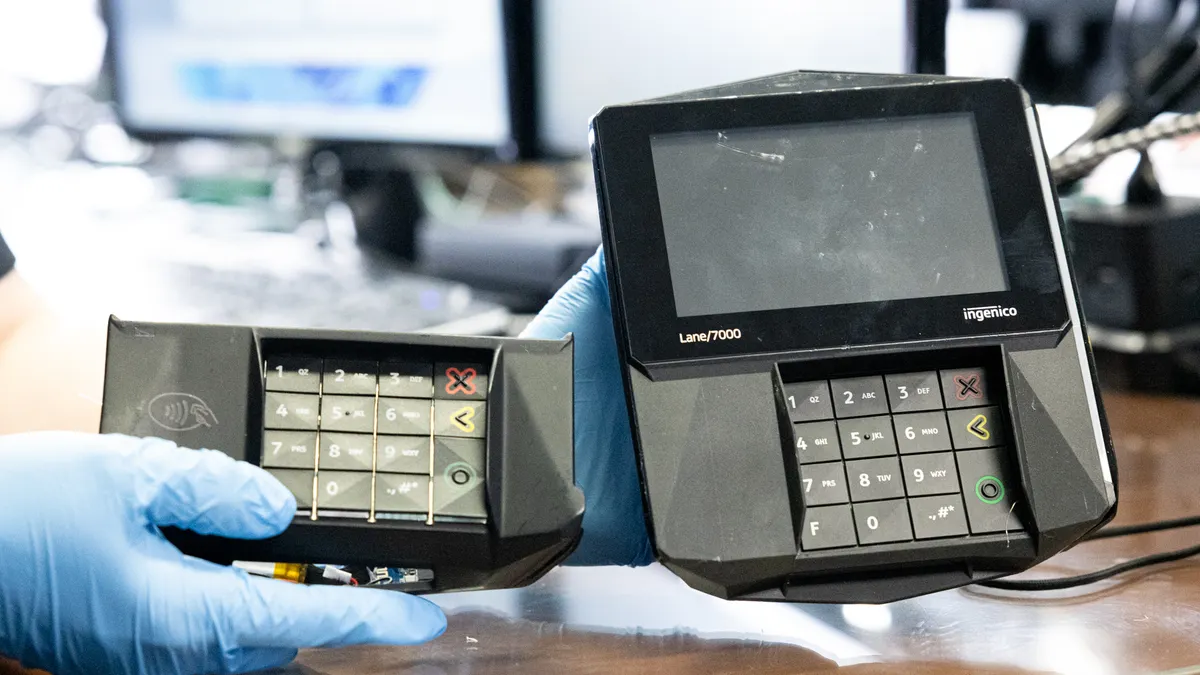Fidelity National Information Services has swallowed several acquisitions this year, and now the big paytech firm is under pressure to show that it can deliver increased revenue and restrained costs.
The company’s chief financial officer, James Kehoe, was peppered with questions on that front last week by JPMorgan Chase’s payments analyst, Tien-tsin Huang, during a May 14 investor conference. Specifically, Huang asked how “potential sticking points” in first-quarter earning results might affect the full-year guidance.
Kehoe was sanguine about the outlook, but acknowledged concern from investors following the company’s May 6 earnings call.
“We think we had a pretty strong start on revenue, especially on the banking business,” Kehoe said in response to the question, though he went on to say it was weak relative to the year-earlier quarter. Margins were better for the company’s capital markets business, he said.
“We didn't get a great reaction (to the earnings webcast), because the margins were a little weak, and we guided to a weaker margin in the second quarter,” Kehoe said. “So, the sticking point for investors right now is the margin and the guide specifically for the second quarter, it made them nervous.”
The Jacksonville, Florida-based company known as FIS relies on the banking division for the bulk of its revenue. That division offers payments, processing, compliance and risk-management software services to financial institutions and it accounted for $1.72 billion of first-quarter revenue. That was more than twice as much as the smaller capital markets division, which offers similar services to trading and asset management clients and earned $764 million in first-quarter revenue.
The company is striving to make sure those two main segments are operating optimally as it attempts to absorb significant acquisitions, notably the $13.5 billion purchase of Global Payments’ issuer business announced last month. As part of a broader deal with Global Payments, FIS also sold its Worldpay merchant services equity stake to that rival.
The company’s CEO, Stephanie Ferris, explained in February how FIS has made five acquisitions, including Demica and Dragonfly, over the past year and is using the new businesses to expand into areas where the company sees rising demand from its banking and capital markets customers.
In the presentation last week, Kehoe played up the rising revenue metric for the company, but emphasized cost streamlining, presumably including job and cost reductions, will buttress profitability in the second half of the year.
“We're not in any way nervous about the full-year guide on margins,” he said, defining that as earnings before interest, taxes, depreciation, and amortization, the CFO said. “We have incredibly strong muscle on taking out cost in the business, and we will take out the cost and we will hit the margin targets” this year, he added.
Kehoe wasn’t specific about what costs the company will take out of the existing FIS business, though he noted he had already eliminated some employees, with more administrative and support roles ripe for whittling.
“Most of our focus right now is on the back-office,” said Kehoe, who joined the company in August 2023 after Ferris became CEO earlier that year. “I outsourced over 1,000 people to Accenture. They’re already gone.”
When asked for more details about the potential cuts, an FIS spokesperson referred to previous company presentations and said the cost-cutting program was part of a strategy to “drive efficiencies across the organization.”
Kehoe also noted the role artificial intelligence can play in reducing costs, saying the company’s human resources department is investigating “virtual agents” with “one of the big software companies.”
“By the time we get to the fourth quarter of this year, we hope to be using machine-learning and AI-generated forecasting,” he said at the conference. “We’re actually pushing the envelope to not necessarily take out resources, but it’s to stop people doing manual work and get the machines to do it.”
The company is targeting $125 million in reduced operating expense as a result of the acquisition of Global Payments’ issuer business, within three years after the deal closes next year. That’s in addition to $45 million in revenue benefits from the addition of that business.
Analysts were relatively upbeat about FIS prospects earlier this month despite the first-quarter report.
The second-quarter forecast was lower than prior estimates and implied a slowdown in the capital markets division revenue, so the company will have to ramp up in the second half of the year to meet the full-year guidance, but it’s achievable, RBC Capital Markets analyst Dan Perlin said in a May 6 note to the investment firm’s clients.
Likewise, a note from TD Cowen analysts to its clients on the same day said FIS “conveyed solid demand” and a stable outlook amid macro-economic volatility.





















